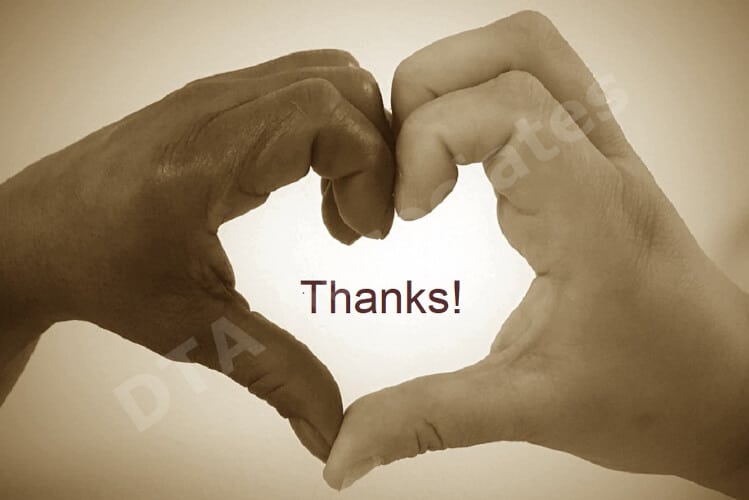
I kid you not, last week a dear friend texted me this: “I’m trying a new thing for my soul this week. Sending out my top three gratitudes via text each night to a few other ladies…and asking for them to do the same, if they have time. It’s been uplifting to my spirit in this crazy time…and I feel more connected to other women, even though we’re not seeing each other very often.”
I immediately responded and joked with her about perfect timing as I was set to blog about gratitude this week! Already, I’ve started to notice that I’m being more mindful of the things I am thankful for as they happen. I’m finding myself keeping track of things that I want to text to the group each evening, like attending my first Kettlebell class this morning and living to tell about it!
I’ve told you before that I never ask the physicians, nurses, techs, clerks, care partners, housekeepers, etc. that we train and coach to do anything that is not authentic. Recently, my perspective changed somewhat on that related to the practice of smiling. I think in many ways the same can be said of thanking or expressing gratitude. Here’s why: expressing gratitude or being thankful, even for just three good things each day, has been shown to reduce burnout and build resilience.
The image on this blog was put together by a frontline team that we were working with at SSM Health Saint Louis University Hospital. It features the images of two hands (a care partner and a housekeeper) coming together to form a heart. They used this image to fit with their service structure approach and training. They even printed thank you cards with this and we had participants send a note (some overachievers sent two or three) to their colleagues! The idea was to foster an attitude of gratitude. The group felt that this was so important after they read many of the articles listed below. They determined that “thanking” or “expressing gratitude” was as important for the person doing the thanking as to the one receiving it!
Building resiliency among the care team is paramount. There’s a rather amazingly simple anecdote for this gaining some traction across the globe but also among the care team in healthcare. Dr. Martin Seligman, a founding father of Positive Psychology — focused on changing from the traditional “disease model” of psychology, which focuses on how to relieve suffering and more on how to enhance well-being. Seligman suggests the “What-Went-Well Exercise” which is also known as the “Three Blessings.” He and his team at the University of Pennsylvania’s Positive Psychology Center have validated these in experiments they have been conducting since 2001 by studying changes in subjects’ life-satisfaction and depression levels.
Seligman’s empirically-tested anecdote:
“Every night for the next week, set aside ten minutes before you go to sleep. Write down three things that went well today and why they went well. You may use a journal or your computer to write about the events, but it is important that you have a physical record of what you wrote. The three things need not be earthshaking in importance (“My husband picked up my favorite ice cream for dessert on the way home from work today”), but they can be important (“My sister just gave birth to a healthy baby boy”). Next to each positive event, answer the question “Why did this happen?” For example, if you wrote that your husband picked up ice cream, write “because my husband is really thoughtful sometimes” or “because I remembered to call him from work and remind him to stop by the grocery store.”
There are apps out there to help you with this – in case you’re wondering! I personally have been experimenting with one simply called “Gratitude Journal ~ the original!”. For those who practice these exercises for two weeks or more, Seligman promises that we’ll be “less depressed, happier, and addicted to this exercise six months from now.”
I share this because I’m completely taken with this simple notion that gratitude can change things – in our own lives and in the lives of others. This is of paramount importance to enabling our care team members as they face difficult situations every day, to remain focused and be mindful and present with their patients. It is imperative that the team supporting and leading this improvement work in patient experience be mindful and focused on this key practice as well.
I’ve included some references below but you may also want to check out a whole section on this in our book, Beyond CAHPS– A Guide for Achieving Patient & Family Centered Care.
Take a moment to share your 3 Good Things or what you’re thankful for this week in the comments below. And did I mention…Thanks!
Based on a February 10, 2014 presentation at MidMichigan Health by J. Bryan Sexton, Ph.D., Director of Patient Safety Center, and Duke University Health System. Research data based on clinical trials conducted at Duke University with three cohorts: neonatal ICU, internal medicine residents and patient safety leadership.
Dr. J. Bryan Sexton. (2012, October 10). Three Good Things. [Video File]. Retrieved from https://www.youtube.com/watch?v=hZ4aT_RVHCs
Seligman, ME; Steen, TA; Park, N; Peterson, C. (2005). Positive psychology progress: empirical validation of interventions. [Abstract]. Am Psychol., 60(5): 410-21.
Seligman, Martin E. (2012). Flourish: A Visionary New Understanding of Happiness and Well-being. New York, NY: Free Press.
Popova, Maria. (n.d.). A Simple Exercise to Increase Well-Being and Lower Depression from Martin Seligman, Founding Father of Positive Psychology. Retrieved from https://www.brainpickings.org/2014/02/18/martin-seligman-gratitude-visit-three-blessings
Ungar, M. (2008). Resilience across Cultures. British Journal of Social Work, 38, 218–35.
Ungar, M. (2011). The social ecology of resilience: addressing contextual and cultural ambiguity of a nascent construct. American Journal of Orthopsychiatry, 81, 1–17.
Roth, Bryan. (2016, February 23). Three Easy Ways to Find Your Resilience. Retrieved from https://today.duke.edu/2016/02/resilience
